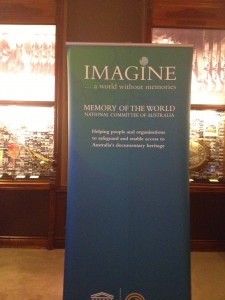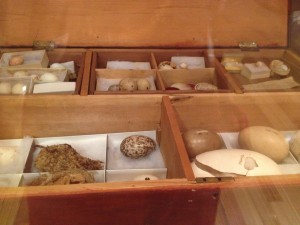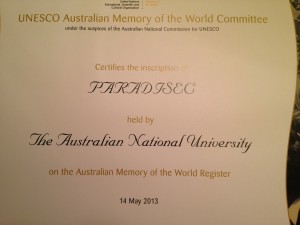Imagine … a world without memories is the evocative and chilling title of a project organised by the National Committee of Australia for the UNESCO Memory of the World.

Through the Australian Memory of the World Register, the Committee, mostly volunteers, are building public awareness of the importance of maintaining records and objects associated with events important to many people. It’s harder to burn down a library if the people who see the flames believe the burning contents are valuable to them. [burn down = de-fund].
In 2001, the first items were added to the Australian Register: James Cook’s Endeavour journal, the Mabo case documents, and landmark constitutional documents. Not a bad balance. This year, 11 items were added, bringing the total to 49.
The event of inscribing these items in the register took place on 14 May 2013 in the splendid Mortlock Chamber of the South Australian State Library with its vaulted ceiling and storied galleries of books. Before the ceremony, I wandered past the Treasures Wall, looking at nineteenth century collections of things and their representations: birds’ eggs, illustrations and classifications of beetles, plants and mushrooms, geological maps, diaries, and J B Cleland’s notes from the Taman Shud case.

These South Australian realia collections made a good frame for thinking about the parallels between them and the kinds of documents inscribed in the Australian Register. Some of the 11 new items were as curious as the pie-dish beetle, others as well organised as the fungus collection, others as decorative as Fiveash’s wildflower paintings, still others — like the records of indentured labourers and convicts — promising stories as sad and sinister as Taman Shud.
Jared Thomas, a Nukunu writer and researcher gave a short speech saying how helpful and important the documentations of the past was — and he mentioned the Norman Tindale collection, one of the 11 new treasures. This has been important for him as a writer, and for him as a Nukunu given the Nukunu native title claims. People could take or challenge the representations given in the early documentation, and could move to the future equipped with a strong understanding of the present and a very strong understanding of the past.
Almost all items come from large state or national institutions with recurrent funding. The items range from sound recordings, the John Meredith folklore collection* of the National Library, to the Holtermann collections of glass negatives taken by Beaufoy Merlin and Charles Bayliss of the Hill End, Mudgee and Gulgong goldfields (State Library of NSW) and F E Williams’ photographs of Papua New Guinea (National Archives and South Australian Museum), to individual items like Colonel William Light’s plan of Adelaide (State Library of South Australia), Thomas Burstow’s eyewitness diary of the bombing raids on Darwin (Northern Territory Library), and three diaries of the goldfields (including Edward Snell’s lovely illustrated diary) (State Library of Victoria), to particular types of records (Convict Records of Western Australia 1838–1910 (State Records Office of Western Australia), and Queensland South Sea Island Indentured Labourer Records 1863–1908 (Queensland State Archives)), to the comprehensive records of the first 50 years of the University of Adelaide.
So it is pretty wonderful that, only ten years after its beginning, and without recurrent fundng, UNESCO has recognised the importance of PARADISEC’s collection through inscribing it on this list. And it follows on PARADISEC’s inclusion in the ‘UNESCO Register of Good Practices in Language Preservation [.doc]’ in 2005. This recognition is a tribute to collaboration — to Linda Barwick and Nick Thieberger and their team, to their universities, and to how much they have achieved on shoestrings. (Note: you can strengthen PARADISEC’s shoestring by sponsoring them — and it’s tax-deductible).
* This award was accepted by Kevin Bradley, and it was a great pleasure to thank him once again for all the help and advice he gave PARADISEC when it was still an egg.

 Follow
Follow
Congrats on PARADISEC’s wonderful news! Hurrah for wonderful, hardworking and brave linguists!!
Best wishes, Sadami